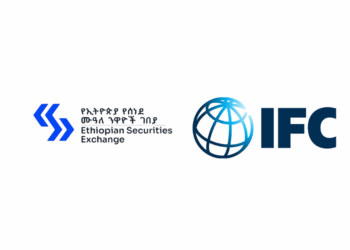Ethiopia made a historic leap in its financial sector today with the official launch of the Ethiopian Securities Exchange (ESX)—the country’s first organized securities trading platform. The inaugural trading session was marked by the public registration and secondary market trading of dematerialized government Treasury bills (T-bills).
Held at the Sheraton Addis Hotel, the launch event brought together key financial stakeholders, including government officials, regulators, banks, and investors. The ceremony featured the symbolic ringing of the trading bell by Gadaa Bank and Wegagen Bank—the first two financial institutions to be registered on the Exchange.
Tilahun Kassahun (PhD), CEO of the Ethiopian Securities Exchange, led the ceremony, calling it a landmark moment in the country’s capital market development journey. “This is the beginning of a new chapter in Ethiopia’s financial landscape—one that opens doors for more transparent, accessible, and diversified investment opportunities,” he said.
Finance Minister Ahmed Shide emphasized the move from physical to digital T-bills as a key modernization step. “This transition allows for more efficient liquidity management and offers citizens a positive-yield domestic investment option,” he noted, framing the launch as a strategic step toward diversifying Ethiopia’s public financing sources.
The event was jointly organized by the Ministry of Finance, the National Bank of Ethiopia (NBE), the Ethiopian Capital Market Authority (ECMA), and the ESX. It marks the culmination of years of policy and regulatory groundwork aimed at establishing a formal capital market ecosystem in Ethiopia.
According to Mamo Mihretu, Governor of the NBE, the launch of the exchange signals a shift in the way Ethiopia approaches development financing. “Traditional sources such as taxes, grants, and loans are no longer sufficient. Capital markets offer a sustainable solution to mobilize domestic resources and drive long-term growth,” he said.
Hana Tehelku, Director General of ECMA, described the event as “the fruition of years of legal and institutional work.” She added, “Today’s T-bill debut is only the beginning. We expect this to instill market confidence, laying the foundation for upcoming listings of corporate bonds and eventually equities.”
In preparation for this launch, Ethiopia rolled out a range of reforms and infrastructure upgrades. Over recent months, ECMA issued key directives to license market participants, while the NBE operationalized the Central Securities Depository (CSD) to facilitate electronic settlement. ESX, on its part, launched its market data platform and developed a digital investor onboarding system to increase accessibility.
Looking ahead, the ESX is expected to expand significantly, with the exchange’s leadership projecting around 90 companies to be listed over the next decade.
A comprehensive list of T-bills issued since August is available on the National Bank of Ethiopia’s website, providing transparency and public access to government-issued investment instruments.
The successful debut of government T-bills sets the tone for deeper financial market development. With growing investor interest, a supportive regulatory environment, and increasing digital integration, Ethiopia’s capital market is poised to play a key role in mobilizing domestic capital, supporting private sector growth, and broadening financial inclusion.
As Ethiopia joins the list of African countries with operational stock exchanges, today’s launch is not just a national milestone—it is a regional signal that East Africa’s financial architecture is entering a new era.























